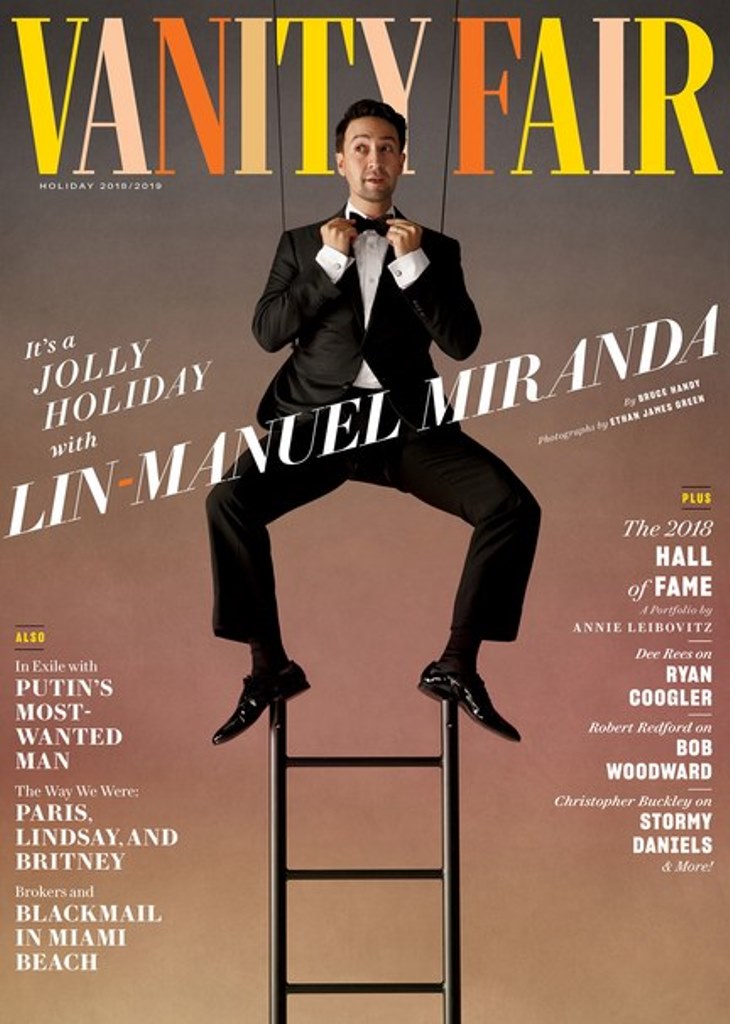Lin-Manuel Miranda, Unexplored in Vanity Fair



If this site had a daily thesis, today’s is ‘the celebrity profile is not dead’. So obviously I dove greedily into Lin-Manuel Miranda’s cover profile in Vanity Fair.
But I came away feeling flat and disappointed. Upset, even. Not what I expected at all. Am I the only one?
Maybe. Because my disappointment isn’t with Lin-Manuel Miranda. The more I read about him – not that there’s much new info for anyone who follows him with any regularity – the more I nodded in recognition. He’s boisterous (the article cites multiple people who call him ‘ebullient’), always doing a million things, and has boundless energy. I get this guy because I recognize these qualities in myself, and as anyone who’s been to ten minutes of therapy can extrapolate, it’s probably why I like him so much.
But there’s something else I recognize here. A tone. Bewilderment, and the slight but unmistakable sense of derision. The inference that nobody’s really like this – and anyone who is is a curiosity, at best. Case in point, when author Bruce Handy meets him after a long flight, he expects him to be jet-lagged, but:
“…He was full of energy, nervous or otherwise, and couldn’t stop bouncing all over his chair, straddling the arms at times or perching on the back. At one point he sprawled on the floor to show me how the camera had been placed for a tricky motorized shot in one of Mary Poppins Returns’s numbers... It was almost as if being asked to sit in one place for two hours was a physical affront.”
I have been described this way often. Accurately. I have sat in four different chairs since the workday began. People close to me, including Lainey, have noted this with an air of affection – but this reads as almost annoyed.
In fact, it’s not a typical celebrity profile at all – no descriptions of drinks in a leather banquette, no spontaneous revelations. It’s primarily a list of LMM’s copious accomplishments and projects, rendered with slight disbelief. This could definitely be because Lin-Manuel has a famously packed schedule that doesn’t allow for languorous interviews, but I couldn’t shake the feeling that Handy figured Lin wouldn’t even want to sit down with three fingers of scotch –and wouldn’t say anything interesting if he did.
Early on, a classmate from Wesleyan, Sam Wasson, gives this quote about LMM’s upbeat nature:
“You want to think, ‘Oh, genius comes with darkness,’ and I’m sure it’s there, but I haven’t seen it.”
In Wasson’s quote it’s clear that what he hasn’t seen is the darkness – but the article implies that since Handy can’t see the darkness either, there might not be any genius there after all.
Why do we do this? Why do we assume that someone whose talents generally serve to make people happy doesn’t have any depth? Why would it mean they’re not as deserving of the kind of deep contemplation Vanity Fair profiles are known for?
Paragraph after paragraph treats the man and the phenomenon surrounding him with amused tolerance, and that same zoo-creature tone. For example, when asked whether Lin ever seems depressed or ‘down’ in private, his wife Vanessa Nadal tells a story: she thought Lin was crazy when he was determined to perform in Hamilton when Jay-Z and Beyoncé were scheduled to be there, even though he had a 104-degree fever. Which – of course he was! WHO AMONG US? But the paragraph ends with Handy’s smug note: “Nadal won that argument.”
I can’t with this. It positions Handy and Nadal as two adults, smiling but firm, shaking their heads ruefully at their immature child. Condescending, sure – but – but Handy never goes deeper to find out why Lin operates that way, why performing for them would be life and death. It’s lazy – and it’s clear that Bruce Handy doesn’t understand his subject, and doesn’t think he’s all that worth understanding, either.
The piece is exhaustively researched, and the connections to Jonathan Larson and the themes of death and legacy in LMM’s work are all meticulously noted …but at arms length, and smirking to boot. Here’s a description of an In The Heights event at Barnes & Noble:
“The store’s event space was jammed with the allotted 500 or so lucky attendees…most were high-school age or even younger—kids who might have been only six or seven when the Broadway production closed in 2011. Judging from the relatively on-key vocalizing, the theater-geek contingent was well represented.”
‘Judging from the relatively on-key vocalizing’ – are you serious? That’s what you felt when you were surrounded by that much love and passion and teenage angst? You didn’t feel transported back to another time in your life when you cared so deeply about something? You didn’t try to understand why these ‘geeks’ wanted to be there so badly? Didn’t relate to anything that was happening, or feel surrounded and swept up in it? Didn’t want to, at least, and feel frustrated that you couldn’t get there?
He didn’t - because it’s cooler not to care. It’s the ‘dark genius’ thing again, the unspoken assertion that if you don’t view things with a detached, heavy-lidded drawl as you drag wearily on a cigarette, then you can’t have felt real pain. You can’t know what real life is like – not coincidentally, the same criticism that’s been lobbed at musical theatre forever. “It’s too fake, I can’t feel it.” That’s fine, I can’t ‘feel’ death metal – but if I were writing a piece about it, I’d try goddamn hard to understand what was so compelling about it to those who love it.
If not ‘getting’ musical theatre was the most egregious error, though, it would be understandable. Not desirable in the person you select to profile the biggest musical theatre star in decades, but understandable.
It becomes inexcusable when we finally get to the nerve center of the roundabout thesis, ‘Genius Without Darkness?’, Handy alludes throughout to LMM’s awareness of mortality, and asks whether Miranda relates to the premature death of Jonathan Larson. Whether that’s what fuels him. LMM explains he related to Mark, the character in RENT who films everything rather than participating, but Handy tells us he’s not satisfied. “What, I pressed, fueled his rare sense of urgency?”
Finally we’re getting somewhere! Finally, he’s interested in what makes this person tick! He hits pay dirt when Lin explains that he was profoundly affected by the death of a friend and classmate when he was in preschool. There it is.
And then, there it isn’t.
Because after describing LMM as subdued, Handy continues, “But then his switch turned on again”. Miranda relates his experience to Harry Potter and Luna Lovegood being the only ones who saw the thestrals in The Order Of The Phoenix:
“ I loved that metaphor because I saw thestrals really early. When dying is concrete, and it’s someone you played in the sandbox with? I think it becomes very real in a way. I’m sure that’s a central part of it for me.”
…And that is the last we hear of it. No questions about what that means for his life, or his children, or what he hopes to do with the time he has. The next paragraph begins with a Tommy Kail quote that could have gone anywhere in the piece, and then we’re back to a rap Lin performs in Mary Poppins Returns, followed by this excerpt from your high school paper:
“…you don’t interview Lin-Manuel Miranda and not ask about his favorite movie musicals, ones he might be drawing ideas from now that he would [sic] soon be directing his own.”
Seriously? Honestly? How do you call yourself a journalist, or even a celebrity profile writer? Someone places their heart of darkness in front of you, and you go, ‘Cool, what musicals do you like?’
It’s just so lazy. It’s not like what I’m asking for is new! By the end of five thousand words on someone, I should know more about them than I did at the beginning. Or, if they’re not forthcoming, then that becomes the story (as in a not dissimilar VF profile of Kate McKinnon).
But this piece decided to go for the lowest-hanging fruit. “This guy is so extra! He’s too much! What even is that?” As if written in a stereotypical jock hallway in a 1982 high school movie. It tells us nothing, and worse, it implies there’s nothing there to tell. That genius without darkness doesn’t exist.
Neither musical theatre nor Lin-Manuel Miranda are for everyone. But to miss the point here – that it’s harder to connect with people or get this much praise and acclaim when your work is ‘light’ –seems like a fatal error, and it’s not an accident that I’m condemning the piece with the worst insult I can think of, one that’s coincidentally the polar opposite of Lin-Manuel Miranda himself.
It’s lazy.

